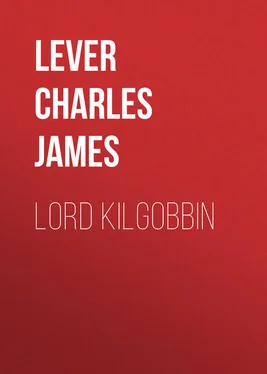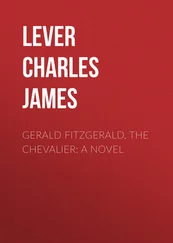Charles Lever - Lord Kilgobbin
Здесь есть возможность читать онлайн «Charles Lever - Lord Kilgobbin» — ознакомительный отрывок электронной книги совершенно бесплатно, а после прочтения отрывка купить полную версию. В некоторых случаях можно слушать аудио, скачать через торрент в формате fb2 и присутствует краткое содержание. Жанр: literature_19, foreign_antique, foreign_prose, на английском языке. Описание произведения, (предисловие) а так же отзывы посетителей доступны на портале библиотеки ЛибКат.
- Название:Lord Kilgobbin
- Автор:
- Жанр:
- Год:неизвестен
- ISBN:нет данных
- Рейтинг книги:3 / 5. Голосов: 1
-
Избранное:Добавить в избранное
- Отзывы:
-
Ваша оценка:
- 60
- 1
- 2
- 3
- 4
- 5
Lord Kilgobbin: краткое содержание, описание и аннотация
Предлагаем к чтению аннотацию, описание, краткое содержание или предисловие (зависит от того, что написал сам автор книги «Lord Kilgobbin»). Если вы не нашли необходимую информацию о книге — напишите в комментариях, мы постараемся отыскать её.
Lord Kilgobbin — читать онлайн ознакомительный отрывок
Ниже представлен текст книги, разбитый по страницам. Система сохранения места последней прочитанной страницы, позволяет с удобством читать онлайн бесплатно книгу «Lord Kilgobbin», без необходимости каждый раз заново искать на чём Вы остановились. Поставьте закладку, и сможете в любой момент перейти на страницу, на которой закончили чтение.
Интервал:
Закладка:
‘Have you told Kate of this?’
‘No, I have not seen her. I don’t know, if I had seen her, that I should have told her. Kate has so grown to believe all my father’s caprices to be absolute wisdom, that even his sudden gusts of passion seem to her like flashes of a bright intelligence, too quick and too brilliant for mere reason. She could give me no comfort nor counsel either.’
‘I am not of your mind,’ said she slowly. ‘She has the great gift of what people so mistakingly call common sense.’
‘And she’d recommend me, perhaps, not to quarrel with my father, and to go and break the stones.’
‘Were you ever in love, Cousin Dick?’ asked she, in a tone every accent of which betokened earnestness and even gravity.
‘Perhaps I might say never. I have spooned or flirted or whatever the name of it might be, but I was never seriously attached to one girl, and unable to think of anything but her. But what has your question to do with this?’
‘Everything. If you really loved a girl – that is, if she filled every corner of your heart, if she was first in every plan and project of your life, not alone her wishes and her likings, but her very words and the sound of her voice – if you saw her in everything that was beautiful, and heard her in every tone that delighted you – if to be moving in the air she breathed was ecstasy, and that heaven itself without her was cheerless – if – ’
‘Oh, don’t go on, Nina. None of these ecstasies could ever be mine. I have no nature to be moved or moulded in this fashion. I might be very fond of a girl, but she’d never drive me mad if she left me for another.’
‘I hope she may, then, if it be with such false money you would buy her,’ said she fiercely. ‘Do you know,’ added she, after a pause, ‘I was almost on the verge of saying, go and break the stones; the métier is not much beneath you, after all!’
‘This is scarcely civil, mademoiselle; see what my candour has brought upon me!’
‘Be as candid as you like upon the faults of your nature. Tell every wickedness that you have done or dreamed of, but don’t own to cold-heartedness. For that there is no sympathy!’
‘Let us go back a bit, then,’ said he, ‘and let us suppose that I did love in the same fervent and insane manner you spoke of, what and how would it help me here?’
‘Of course it would. Of all the ingenuity that plotters talk of, of all the imagination that poets dream, there is nothing to compare with love. To gain a plodding subsistence a man will do much. To win the girl he loves, to make her his own, he will do everything: he will strive, and strain, and even starve to win her. Poverty will have nothing mean if confronted for her, hardship have no suffering if endured for her sake. With her before him, all the world shows but one goal; without her, life is a mere dreary task, and himself a hired labourer.’
‘I confess, after all this, that I don’t see how breaking stones would be more palatable to me because some pretty girl that I was fond of saw me hammering away at my limestone!’
‘If you could have loved as I would wish you to love, your career had never fallen to this. The heart that loved would have stimulated the head that thought. Don’t fancy that people are only better because they are in love, but they are greater, bolder, brighter, more daring in danger, and more ready in every emergency. So wonder-working is the real passion that even in the base mockery of Love men have risen to genius. Look what it made Petrarch, and I might say Byron too, though he never loved worthy of the name.’
‘And how came you to know all this, cousin mine? I’m really curious to know that.’
‘I was reared in Italy, Cousin Dick, and I have made a deep study of nature through French novels.’
Now there was a laughing devilry in her eye as she said this that terribly puzzled the young fellow, for just at the very moment her enthusiasm had begun to stir his breast, her merry mockery wafted it away as with a storm-wind.
‘I wish I knew if you were serious,’ said he gravely.
‘Just as serious as you were when you spoke of being ruined.’
‘I was so, I pledge my honour. The conversation I reported to you really took place; and when you joined me, I was gravely deliberating with myself whether I should take a header into a deep pool or enlist as a soldier.’
‘Fie, fie! how ignoble all that is. You don’t know the hundreds of thousands of things one can do in life. Do you speak French or Italian?’
‘I can read them, but not freely; but how are they to help me?’
‘You shall see: first of all, let me be your tutor. We shall take two hours, three if you like, every morning. Are you free now from all your college studies?’
‘I can be after Wednesday next. I ought to go up for my term examination.’
‘Well, do so; but mind, don’t bring down Mr. Atlee with you.’
‘My chum is no favourite of yours?’
‘That’s as it may be,’ said she haughtily. ‘I have only said let us not have the embarrassment, or, if you like it, the pleasure of his company. I’ll give you a list of books to bring down, and my life be on it, but my course of study will surpass what you have been doing at Trinity. Is it agreed?’
‘Give me till to-morrow to think of it, Nina.’
‘That does not sound like a very warm acceptance; but be it so: till to-morrow.’
‘Here are some of Kate’s dogs,’ cried he angrily. ‘Down, Fan, down! I say. I’ll leave you now before she joins us. Mind, not a word of what I told you.’
And, without another word, he sprang over a low fence, and speedily disappeared in the copse beyond it.
‘Wasn’t that Dick I saw making his escape?’ cried Kate, as she came up.
‘Yes, we were taking a walk together, and he left me very abruptly.’
‘I wish I had not spoiled a tête-à-tête ,’ said Kate merrily.
‘It is no great mischief: we can always renew it.’
‘Dear Nina,’ said the other caressingly, as she drew her arm around her – ‘dear, dear Nina, do not, do not, I beseech you.’
‘Don’t what, child? – you must not speak in riddles.’
‘Don’t make that poor boy in love with you. You yourself told me you could save him from it if you liked.’
‘And so I shall, Kate, if you don’t dictate or order me. Leave me quite to myself, and I shall be most merciful.’
CHAPTER XVIII
Had Mathew Kearney but read the second sheet of his correspondent’s letter, it is more than likely that Dick had not taken such a gloomy view of his condition. Mr. McKeown’s epistle continued in this fashion: ‘That ought to do for him, Mathew, or my name ain’t Tom McKeown. It is not that he is any worse or better than other young fellows of his own stamp, but he has the greatest scamp in Christendom for his daily associate. Atlee is deep in all the mischief that goes on in the National press. I believe he is a head-centre of the Fenians, and I know he has a correspondence with the French socialists, and that Rights-of-labour-knot of vagabonds who meet at Geneva. Your boy is not too wise to keep himself out of these scrapes, and he is just, by name and station, of consequence enough to make these fellows make up to and flatter him. Give him a sound fright, then, and when he is thoroughly alarmed about his failure, send him abroad for a short tour, let him go study at Halle or Heidelberg – anything, in short, that will take him away from Ireland, and break off his intimacy with this Atlee and his companions. While he is with you at Kilgobbin, don’t let him make acquaintance with those Radical fellows in the county towns. Keep him down, Mathew, keep him down; and if you find that you cannot do this, make him believe that you’ll be one day lords of Kilgobbin, and the more he has to lose the more reluctant he’ll be to risk it. If he’d take to farming, and marry some decent girl, even a little beneath him in life, it would save you all uneasiness; but he is just that thing now that brings all the misery on us in Ireland. He thinks he’s a gentleman because he can do nothing; and to save himself from the disgrace of incapacity, ‘he’d like to be a rebel.’
Читать дальшеИнтервал:
Закладка:
Похожие книги на «Lord Kilgobbin»
Представляем Вашему вниманию похожие книги на «Lord Kilgobbin» списком для выбора. Мы отобрали схожую по названию и смыслу литературу в надежде предоставить читателям больше вариантов отыскать новые, интересные, ещё непрочитанные произведения.
Обсуждение, отзывы о книге «Lord Kilgobbin» и просто собственные мнения читателей. Оставьте ваши комментарии, напишите, что Вы думаете о произведении, его смысле или главных героях. Укажите что конкретно понравилось, а что нет, и почему Вы так считаете.












